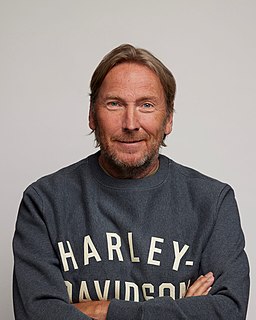A Quote by Henry Ford
A business absolutely devoted to service will have only one worry about profits. They will be embarrassingly large.
Related Quotes
There is room in this great and growing city for a journal that is not only cheap but bright, not only bright but large, not only large but truly democratic-dedicated to the cause of the people rather than that of the purse potentates-devoted more to the news of the New than the Old World-that will expose all fraud and sham, fight all public evils and abuses-that will sever and battle for the people with earnest sincerity.
Some people would argue the other side: that the business of business is business, and companies should only be focused on profits. But in today's world, I don't think corporations can only be focused on profits, because they are inextricably linked with the communities that they serve. I do not believe you can be a leader in your industry without being a leader in your community. It's a fundamental shift in how you think about business.
Fortunately I am not the first person to tell you that you will never die. You simply lose your body. You will be the same except you won't have to worry about rent or mortgages or fashionable clothes. You will be released from sexual obsessions. You will not have drug addictions. You will not need alcohol. You will not have to worry about cellulite or cigarettes or cancer or AIDS or venereal disease. You will be free.
In many ways, large profits are even more insidious than large losses in terms of emotional destabilization. I think it's important not to be emotionally attached to large profits. I've certainly made some of my worst trades after long periods of winning. When you're on a big winning streak, there's a temptation to think that you're doing something special, which will allow you to continue to propel yourself upward. You start to think that you can afford to make shoddy decisions. You can imagine what happens next. As a general rule, losses make you strong and profits make you weak.
The government in business may waste time and money without rendering service. In the end the public pays in taxes. The corporation cannot waste or it will fall. It cannot make unfair rulings or give high-handed, expensive service, for there are not enough people willing to accept inferior service to make a volume of business that will pay dividends.
From building a fire one can learn something about artistic composition. If you use only small kindling and large logs, the fire will quickly eat up the small pieces but will not become strong enough to attack the large ones. You must supply a scale of sizes from the smallest to the largest. The human eye also will not make its way into a painting or building unless a continuum of shapes leads from the small to the large, from the large to the small.
Organized business has assumed that greater profits would be pretty much of a cure-all, and it has to a major extent ignored the fact that the welfare of business rests upon the welfare of the consumers of a nation; that business or free enterprise will function in a democracy only so long as the democracy functions.
Let everybody know this. He shall be assigned to the place and to the service to which he gave and devoted himself in this life and he can be sure that in eternity he will have as his lot the service and the companionship which he preferred in this life. This is what the Lord means when He says, 'If anyone is my servant let him follow Me and where I am he will be there as my servant' (Jn. 12:26).
The successful entrepreneurs on the free market will be the ones most adept at anticipating future business conditions. Yet, the forecasting can never be perfect, and entrepreneurs will continue to differ in the success of their judgments. If this were not so, no profits or losses would ever be made in business.
The old way of doing 'good business' was based on the principle, 'the ends justifies the means.' In the future, good business will invoke 'the means justifying the ends.' The E P&L can already serve as an important tool to help this shift in commerce from generating profits with collateral damages to profits with collateral benefits.
The business plan should address: "How will I get customers? How will I market the product or service? Who will I target?" The principles of a business plan are pretty much the same. But after page one to two, everything is unpredictable, because costs or competition will change and you don't know how things will be received by the market. You have to be able to continually adapt. Companies that fail to adapt will die. Others are brilliant at adapting.


































